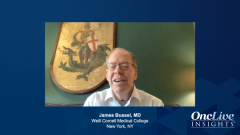
Treatment of Early Immune Thrombocytopenia (ITP)
Drs Bussel and Kessler discuss treatment of early immune thrombocytopenia (ITP).
Episodes in this series

James Bussel, MD: Good morning, everyone. It’s our pleasure to welcome you to an OncLive® Insights® discussion titled “Management of Patients with Immune Thrombocytopenia.” We have a distinguished panel that’s going to provide an interactive discussion of certain aspects of ITP [immune thrombocytopenia]. We can’t cover everything, but our distinguished panel has selected several cutting-edge items that will be interesting. Our panel consists of Craig Kessler, a professor at Georgetown University and a leading voice on ITP and hematology for years. He will help us with his wisdom and insights. Our other panelist is Caroline Piatek, a rising star at USC [the University of Southern California] by inheriting the mantle of Howard Liebman and Ilene Weitz as she develops her career.
My name is Jim Bussel. I’m a professor emeritus at Weill Cornell Medicine in New York. Because we can’t cover everything, we thought 1 of the features we would start with is treatment for early ITP. We’re not intending to discuss the use of IVIG [intravenous immune globulin] and steroids much, but Dr Kessler has promised us later a brief comparison of dexamethasone and prednisone. We’re going to take advantage of the ASH [American Society of Hematology] guidelines and international consensus reports. They both highlight the overuse of steroids in the early stages. Recently, at least 1 thrombopoietic agent has been licensed for us in newly diagnosed patients. We thought we’d start by discussing different frontline therapy strategies beyond IVIG and steroids, which can make it easier for practitioners to cut short the overuse of steroids. Craig, you were kind enough to volunteer to start. Tell us a little about the key points of TPO agents.
Craig Kessler, MD: Jim, the TPO agents have been a game changer in the treatment of ITP. As we see the successes of the TPO receptor agonist in the chronic phases of ITP, there’s a tendency to want to move the TPO agents closer to the acute management of ITP. This has been a very important move. There’s 1 TPO receptor agonist that’s been licensed for use in the persistent phase of ITP. One very interesting trial was published in the American Journal of Hematology last year, a randomized prospective study using TPO receptor agonists plus high-dose dexamethasone. This was compared with a high dose of dexamethasone alone. That study showed some very remarkable and encouraging results. The study indicated over 80% complete response rate in the TPO-plus-dexamethasone arm vs the high-dose dexamethasone arm alone. This information makes this combination possible, and it gives us feasibility to show that there’s safety and efficacy using that combo. In addition, there was an earlier trial looking at high-dose dexamethasone vs prednisone at the 1 mg/kg dose vs dexamethasone 40 mg orally daily for 4 days. There was statistically significant difference in that study with the immediate and complete response rate in the high-dose dexamethasone group vs prednisone. The attractiveness of the TPO study that I described is that we can probably limit the amount of corticosteroids in many of our patient populations because of the high degree of complications with continued high-dose corticosteroids.
James Bussel, MD: I’m going to comment briefly on the FLIGHT trial published in the New England Journal of Medicine recently looking at MMF [mycophenolate mofetil] plus steroids vs steroids alone. In that study, a relatively small number of patients used dexamethasone.It appears that the combination was better in leading the cure in close to 80% vs steroids alone, which was surprisingly over 50%. There are a lot of flaws in that trial. It’s interesting that the quality of life was worse on the combination. We all thought it would be better because patients would use less steroids. There’s enough controversy that we can’t rely on it other than as an example.
Craig Kessler, MD: Just to be a little controversial, that was an older population. Using high-dosage mycophenolate in an older population may not be the best way to handle ITP. Instead, maybe a younger population will be able to tolerate that dosing regimen better than the older population.
James Bussel, MD: That’s right: 27% or more were over 65 years old in that study, which is significant.
Transcript Edited for Clarity









































